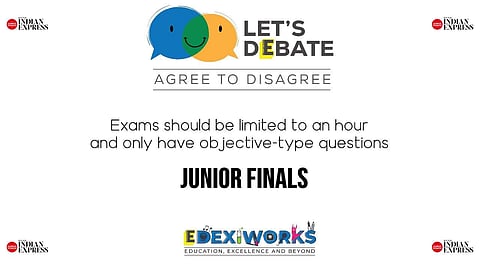

These are probably the worst of times but we are braving through the pandemic the best we can. Looking at a future when the clouds of the pandemic would clear, how would school education look like? Will there be a sea change in the way exams were conducted? Well, the children who would appear for the exams should be the ones answering these questions. And they did, at The New Indian Express' Let's Debate Junior Finale. The motion — 'After the pandemic, exams should only have objective-type questions and be limited to an hour'.
The very witty and humourous Advait Anand from Chennai's Padma Seshadri Bala Bhavan won the Let's Debate Junior category this year and also walked away with the award for being the most humourous speaker. Hyderabad resident Charuhasini Chaitra Madasu who is a student of the Meridian School was adjudged the runner-up. But judge Kaveree Bamzai, who is a Senior Journalist and an author, said that she has the potential and can definitely be a strong contender for winning the debate next year.
"Imagine having to converse with someone but you are allowed to answer in either yes or no. Or even choose from just four options. Monotonous, right? Exactly the same with exams, which are also a form of communication between one's self and the concerning subject. Objective questions narrows down the scope of a child's understanding of a concept and (takes away) the opportunity to elaborate and explain their perspective," said Advait Anand, who spoke against the motion and was also lauded for his vocabulary. "He might as well be the next Shashi Tharoor," quipped Author Anuja Chandramouli, who jointly judged the debate with Kaveree.
Talking about online exams becoming a norm and schools putting Learning Management Systems in place Charuhasini said, "While online exams may have become the norm now, it was first introduced in 1982 by Western Behavioural Sciences Institute in California, USA, through online conference. The world of learning and evaluation has come a long way — moving away from the historical methods of subjective exams to modern objective methods. Frankly, tutors can make better use of their time by holding lectures on in-depth sub-knowledge and not just restrict it to the given portion. This will help the child develop a deeper understanding of the subject and lead to innovation."
Khai Jun Divakar, from Kerala's The Choice School, had won hearts in the prelims to become one of the wild card entries to the final and he did not disappoint here as well. "All my teachers are lovely people except on those days called exam days," while Khai's opening comment started on the lighter side, he soon took a turn deeper into philosophy of objective reality which won him the Finest Point award.
"All my opponents here, does not even know about bloom's taxonomy which consists of three hierarchical models which talks about intellectual skills. One of them is a triangle with six levels — knowledge, comprehension, application, analysis, evaluation and creation. I would like to say that objective type questions can cover all of these and this would be a noble mission for the diffabled kids and make their lives brighter," said Aditya A Gaikwad, RM Shah Public School, from rural Karnataka.
The pandemic has turned the knowledge imparting machinery upside down, said Anjali Menon from the Blooming Buds Bethania English School, Vellithuruthi in Kerala. "With the in-person teachers getting in a box in gadgets, the real feel of face-to-face teaching is lost, for students and teachers alike. Self-learning has assumed greater importance. With online classes eating up a sizeable part of the day, kids end up spending more time in front of the screens. The least that can be done is to have objective questions (and exams) of shorter duration," added a very animated Anjali. She also added that objective questions are fact-based, crisp and unbiased and it would be easier for the teacher to mark the students — it's either right or wrong.
But Abhijit Majhi from Berhampur in Odisha said that limiting either the question type or the time limit would only put more pressure on the students. Indian students are already under a pressure to perform better, limiting the questions to just objective ones, would push them to memorise without understanding. "If the time is limited to just an hour the students will be pressurised and they might not even be able to complete the paper," added Abhijit, a student of the De Paul School, Berhampur.
The others participating in the debate — Tehniyat Nabi, Stepping Stones High School, Aurangabad, Minerva Siddhi, DAV Public School, Bhubaneswar, Shreeja Mallick, Shiv Nadar School in Noida and Michelle Theophine, Rajagiri Christu Jayanthi Public School, Kochi — were congratulated by the judges for their eloquence and civility, which we rarely find in debates of the grown-ups.
The New Indian Express conducted Let's Debate, India's largest inter-school virtual debate competition, in association with Hindustan Institute of Technology and Science and MEIL.
